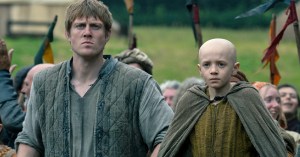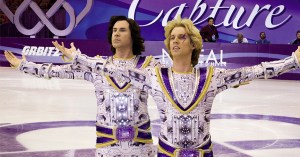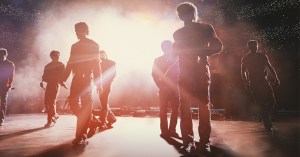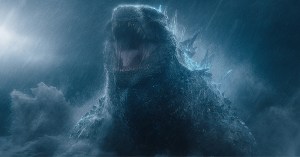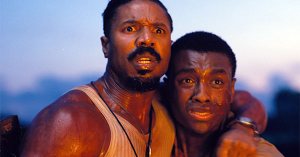Rank Will Ferrell’s 10 Best Movies
We count down the best-reviewed work of the star of The House.
The list of Saturday Night Live cast members who have made us laugh is long — but the number of SNL vets who have managed to make a successful go of it on the big screen, especially over the long term, is much smaller. With over a billion dollars in global box office receipts to his name — a total that will expand when he returns to theaters with Amy Poehler in The House this weekend — it’s safe to say Will Ferrell is part of that exclusive group, and in honor of his achievements, we’ve decided to dedicate this week’s list to his 10 best-reviewed movies. Get off the shed, because it’s time for Total Recall!
1.

(Photo by Warner Bros.)
Will Ferrell’s finest films are the ones that take full advantage of both sides of his on-screen persona, allowing him to indulge his gift for playing a belligerent man-child as well as displaying some real sensitivity. It’s fitting, then, that The LEGO Movie ended up at the top of our list of Ferrell’s 10 best movies: While he’s a dangerous buffoon for most of it, lending his voice to the maniacal, order-hungry Lord Business during the animated portion of the story, he’s also on hand for some of LEGO‘s most poignant moments during the part at the end where — well, we won’t spoil it for you. Suffice it to say that although we tend to take a hard look at animated features on most of these lists, this is one case where top honors are deserved. “It’s one of the few movies based on a toy with no explicit story behind it,” observed Katey Rich for Vanity Fair. “And it is, so far, the only one that’s really good.”
2.

(Photo by New Line courtesy Everett Collection)
You could put pretty much any 6’3″ actor in an elf suit and get some chuckles, but casting Will Ferrell as an orphan raised at the North Pole — by Bob “Papa Elf” Newhart, no less — was a stroke of comic genius. What tends to get lost in all the shouting and inappropriate nudity is that Ferrell excels at playing gentle, childlike men whose open-heartedness is exceeded only by their oafishness, and in Elf‘s Buddy Hobbs, he found a role that perfectly highlighted that skill. And the casting genius didn’t end there — Elf also includes inspired turns by Newhart in an elf’s cap, Ed Asner as Santa, James Caan as Ferrell’s gruff, exasperated biological father, and, for Pete’s sake, Leon Redbone as a talking snowman. Singling out holiday movies for critical beatdowns has become something of an annual tradition, but in this case, our top scribes were left filled with holiday cheer — like the late Roger Ebert, who beamed, “this is one of those rare Christmas comedies that has a heart, a brain and a wicked sense of humor, and it charms the socks right off the mantelpiece.”
3.

(Photo by Columbia Pictures)
For much of his film career, Ferrell has scooped added helpings of laughs out of being placed alongside well-chosen comedic foils. John C. Reilly has gotten particularly good mileage out of matching him guffaw for dunderheaded guffaw, but Ferrell can also be brilliantly funny when his bozo routine has a fussy, tight-lipped straight man to bounce off, and 2010’s The Other Guys is a perfect example. By placing Ferrell’s knuckleheaded Detective Allen Gamble opposite Mark Wahlberg’s desperately straight-laced Detective Terry Hoitz, Guys pumped a few extra chuckles into the well-worn buddy cop formula — and worked in a little savvy bailout-era social commentary in the bargain. “Just go and see it,” ordered Nigel Andrews for the Financial Times. “And send me the bill if you don’t laugh.”
4.

(Photo by Gemma LaMana/Paramount Pictures)
Long after even its most ardent and/or munchies-tormented fans had given up hope of ever seeing a sequel, Ferrell and his frequent creative partner Adam McKay managed to get a follow-up to 2004’s cult classic Anchorman off the ground, reuniting the original’s brilliant cast (many of whom had been bumped up several pay grades in the interim) to show audiences what the endearing blowhard Ron Burgundy and his largely incompetent news team had been up to over the ensuing nine years. Surrounded by a gifted comedic team that included Anchorman vets such as Steve Carell, Paul Rudd, and Christina Applegate, as well as new additions like Kristen Wiig, Ferrell helped make Anchorman 2: The Legend Continues another dose of dada bliss — and one of the rare sequels whose reviews manage to surpass those of its predecessor. “Maybe McKay and his cast simply captured another bolt of lightning in Ron’s empty scotch bottle; more likely, they were just as inspired this time around as they were during the first film,” wrote Cammila Collar for TV Guide. “Regardless, they’ve definitely kept it classy.”
5.

(Photo by John Estes/Roadside Attractions courtesy Everett Collection)
If you’re going to adapt a Raymond Carver short story about an alcoholic loser who reacts to losing his job and being kicked out of his home by camping out in his front yard and selling off his possessions, you could do a lot worse than hiring Will Ferrell to play your protagonist. Case in point: 2011’s Everything Must Go, in which writer-director Dan Rush affords Ferrell plenty of room to explore the premise’s dramatic depths while lending a healthy amount of laughs to a situation that probably wouldn’t seem all that funny if it happened to any of us. Unlike a lot of forays into more thoughtful territory by actors known for their comedic chops, Everything earned a surprising number of critical accolades along the way, including Simon Gallagher’s review for What Culture, which deemed the movie “a pleasantly engaging, entertaining human portrait — a journey that doesn’t physically stray very far, but which treads a million metaphorical miles within its main character as he attempts to go from broken man to redeemed man.”
6.

(Photo by Sony Pictures courtesy Everett Collection)
Part buffoonish comedy, part NASCAR fable, Talladega Nights sped past all the cries of “not another Will Ferrell sports comedy” to an impressive $162 million worldwide gross — and, more importantly, a 72 percent Tomatometer rating and Certified Fresh status. Though the none-too-bright Ricky Bobby was essentially just another variation of the same character Ferrell had been playing for years, Talladega proved that character could still be funny — starting with the trailer and TV spots, in which an underwear-and-helmet-clad Ricky engages in a panicked run around a racetrack, screaming for Tom Cruise to “use your witchcraft on me to get the fire off me.” In the words of Wesley Morris of the Boston Globe, Talladega Nights is “the sort of cheerfully asinine comedy that twists your arm until you submit. So, to Will Ferrell — clown, freak, bully — I scream, ‘Uncle!’”
7.

(Photo by Sony Pictures courtesy Everett Collection)
For many comics, branching out from lighthearted comedies to more dramatic fare is seen as a rite of passage; Bill Murray had The Razor’s Edge, Jim Carrey started nudging away from straight comedy with The Cable Guy and The Truman Show, and even Dane Cook has popped up in serious films such as Mr. Brooks and Dan in Real Life. For Will Ferrell, the chance to flex his dramatic muscle came with Stranger than Fiction, a 2006 dramedy about an IRS auditor who slowly realizes that the events taking place in his life are the result of an unseen author who may be leading him to a rather unhappy ending. It’s the sort of heady premise that Ferrell’s detractors would say he lacks the depth or breadth to carry — but they’d be wrong, as evidenced by Fiction‘s 72 percent Tomatometer score. Though he was certainly surrounded with top talent — such as a supporting cast that included Dustin Hoffman, Emma Thompson, and Maggie Gyllenhaal — Ferrell’s performance was singled out by critics like Lisa Kennedy of the Denver Post, who wrote that he “delivers a moving and surprisingly delicate — though not so surprisingly funny — turn as the lonesome bureaucrat bedeviled by a voice only he hears.”
8.

(Photo by Columbia Pictures courtesy Everett Collection)
By the late 1990s, Ferrell had emerged as the next Saturday Night Live cast member to make the jump to movies — both within the SNL family, in projects like Superstar and A Night at the Roxbury, and also in non SNL-affiliated fare, such as the first two Austin Powers movies, the independently released The Suburbans, and 1999’s Dick. Supporting Kirsten Dunst and Michelle Williams in this 1970s-set comedy about a pair of teenage girls that exposes the nefarious deeds of Richard Nixon (Dan Hedaya), Ferrell appears as a bumbling, thin-skinned version of Bob Woodward opposite Bruce McCulloch’s equally incompetent Carl Bernstein. Though the allegedly investigative duo is more interested in insulting each other than cracking a story (in one memorable exchange, Ferrell tells McCulloch that he smells “like cabbage”), they’re eventually pointed in the right direction by Dunst and Williams; similarly, although audiences seemed not to know what to make of Dick, critics applauded it for being, in the words of Entertainment Weekly’s Lisa Schwarzbaum, “a gaily funny, shrewdly inventive satire.”
9.

(Photo by Paramount courtesy Everett Collection)
Love him or hate him, it’s hard to deny that Will Ferrell has a knack for finding (or writing) scripts built around concepts so ridiculous you can’t help but laugh — and 2007’s Blades of Glory, a comedy about a pair of competitive skaters who are forced to form an ice dancing team after an awards ceremony brawl leaves them barred from men’s singles, is a perfect case in point. Ferrell’s brand of fearlessly stupid comedy is perfect for any script that requires him to spend time in a unitard, and Jon Heder’s sleepy-eyed hostility made him a worthy foil for his louder, hairier co-star. Although Ferrell had already done more than one sports-themed comedy, Blades of Glory still packed enough laughs to satisfy most critics, including the Hollywood Reporter’s Michael Rechtshaffen, who praised it as “one of those rare comedies that puts a goofy smile on your face with the premise alone, and keeps it planted there right until its wacky finale.”
10.

(Photo by Universal courtesy Everett Collection)
Any movie that comes with a tagline as corny as “Show Me the Monkey!” is deserving of skepticism, particularly if the film in question is an animated adaptation of an old series of children’s books — but 2006’s Curious George proved a worthy big-screen extension of H.A. and Margaret Rey’s beloved bestsellers, giving the furry little rascal a spiffy 21st-century makeover without losing any of the sweet charm that made the character an icon in the first place. As the voice of George’s longtime foil The Man in the Yellow Hat (here named Ted Shackleford), Ferrell certainly wasn’t the film’s chief draw for its target demographic, but he did add a bit of marquee value to a cast that included Drew Barrymore, David Cross, Eugene Levy, and Dick Van Dyke, helping George swing its way to a mildly surprising $69 million worldwide gross. The movie’s gentle spirit and extensive use of traditional animation couldn’t compete with the louder, flashier CGI fare prevalent at the box office, but they weren’t meant to; as Colin Colvert of the Minneapolis Star Tribune wrote, “the makers of Curious George have figured out how to make an innocent cartoon that will amuse knee-nuzzlers without hitting adults like a liter of chloroform.”



